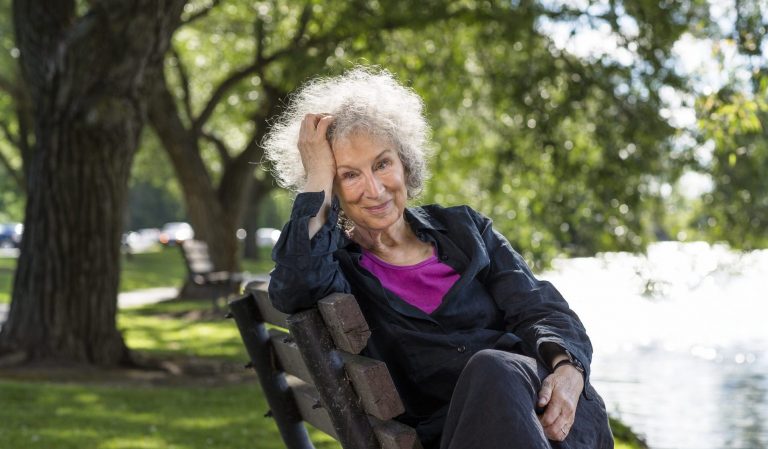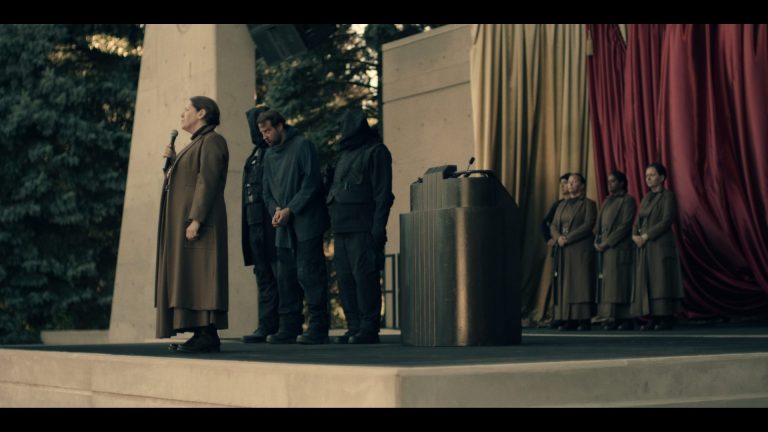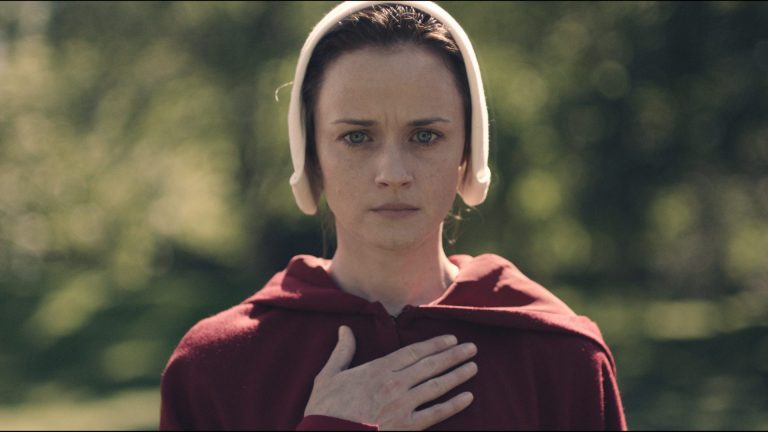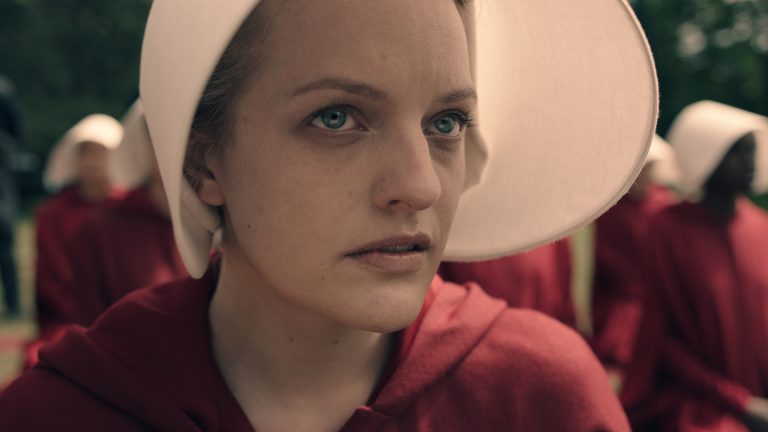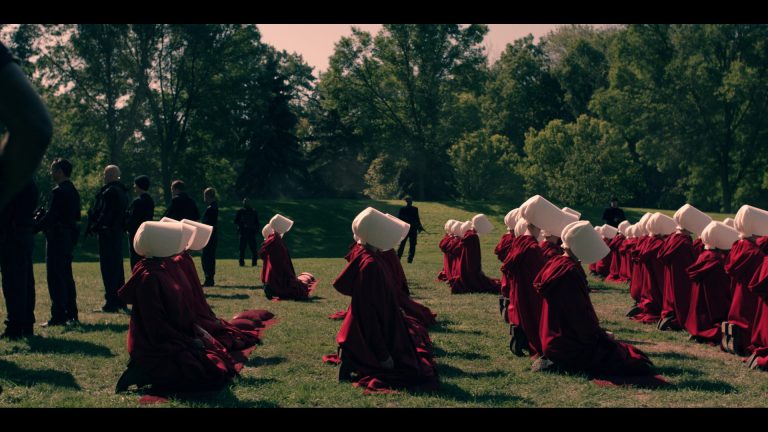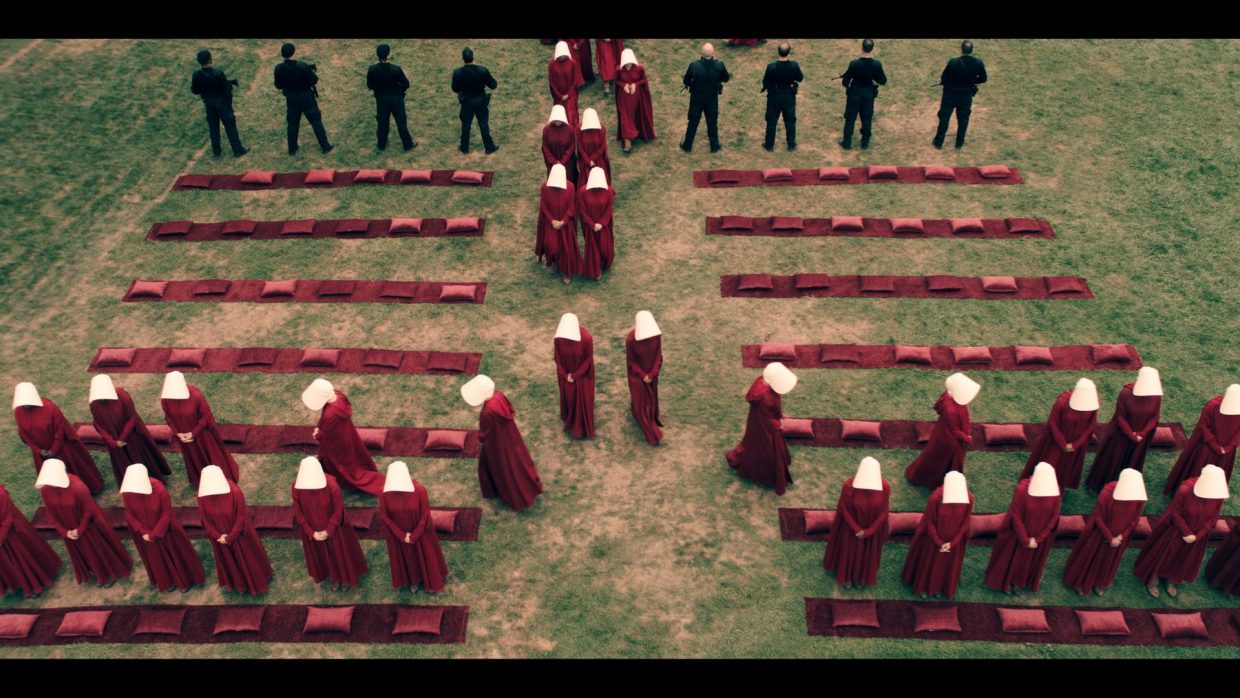
7 February 2018
INTERVIEW: Margaret Atwood, author of The Handmaid’s Tale
The multi-award winning dystopian drama series The Handmaid’s Tale is a dark, terrifying journey into an era that’s not so far-flung from our own, told through the voice of one of the many victims of the totalitarian regime – Offred, the Handmaid, a woman who used to be called June, who used to have a husband, a daughter, a job, and a life. She was ordinary. She was you, and she was me. But as Offred, she unwillingly and almost unwittingly sets out to undermine the regime, piece by piece, using the little power she has at her disposal.
Offred and the regime that has imprisoned her – and every other woman in what used to be the United States – were born in the mind of Canadian author Margaret Atwood in the year 1984. Read on to hear her thoughts on the show, and her inspiration for the ground-breaking novel.
Right now we are in a golden age for making novels into longer series.
Q: What did you think when you were approached about turning The Handmaid’s Tale into a television show?
A: Television productions these days are thoroughly developed, well written, and have high production value, which gives production companies the opportunity to delve deeper into novels than you would be able to do in a 90-minute film. You can build out characters and draw out suspense in a way that leaves people wanting to see what’s going to happen. Right now we are in a golden age for making novels into longer series.
My rule for the book was I would not put anything into it that human beings had not done at some time in someplace already in history. Everything in the book has a precedent.
Q: Can you talk a bit about the context in which you wrote this book?
A: I started writing The Handmaid’s Tale in 1984. I wrote it for several reasons.
First, I had a background in dystopian fiction and I had always wanted to write a novel that took place in a society different from ours, but with a female character as the narrator. I also had studied 17th-Century Puritan America, a theocracy – not a democracy – that, I believe, underlies America as its foundation.
Finally, I was of an age to have seen various totalitarianisms come and go, and I never believed “It can’t happen here.” My rule for the book was I would not put anything into it that human beings had not done at some time in someplace already in history. Everything in the book has a precedent. For instance, the Handmaids and women in general are not allowed to read. It was illegal for slaves in America to read, just for instance.
You can go through all of the different pieces in the novel and ask me where in history it happened and I can tell you.
You can go through all of the different pieces in the novel and ask me where in history it happened and I can tell you. I was living in West Berlin at the time. It was an open city, but it was surrounded by East Germany. Every Sunday, the East Germans would fly supersonic planes that made booms just to remind us that they were there. As a Canadian, I could go into East Berlin, which I did. I also went into Czechoslovakia and Poland, both of them still Iron Curtain countries. At that moment, 1984, nobody thought the wall was going to come down anytime soon, but five years later, down it came.
When the novel was made into a film, we launched the film in both West and East Berlin because the wall had come down. It was the first time for a very long time – since before World War II – that such a thing had been possible. We showed the film in West Berlin and the conversation was about the direction, the design, and the acting. When we went to East Berlin, it was very different. The audience was quite silent. They watched it very intently and then they said, “This was our life.” They meant that they had lived in a country where they did not know who they could trust – that clamped down feeling of not knowing at any point who you might be talking to.
Q: Can you talk a bit about the direction the show takes versus the book?
A: The television series follows characters that aren’t dealt with in depth in the novel, and sometimes the series shows events that aren’t in the book at all. In the book, the character called Ofglen (played in the series by Alexis Bledel) just disappears, and we don’t know what happened to her. It’s a very chilling moment. Offred – the central character – goes out for her usual walk with her partner, since they have to go about in twos like nuns of old. She’s expecting the usual person to be there and it’s a different person. She says, “What happened to Ofglen?” This new person says, “I am Ofglen.” End of conversation. Offred can’t find out anything else in the book, but in the series, we find out what happens to Ofglen.
Offred can’t find out anything else in the book, but in the series, we find out what happens to Ofglen.
Q: What do you think about the series?
A: It is very strong. The actors are excellent – great performances – and the production value is high. The tension in the series is nail-biting: you feel on edge all the time because you have such an emotional connection to the characters, especially Offred. She is a person navigating a world in which she’s always under suspicion. In this world, much is expected of Offred, and if she doesn’t produce, she’s out. The tension in the household where Offred lives is extreme, because there’s a pyramid of power. At the top of the pyramid are the higher ranking males such as Commander Waterford, played by Joseph Fiennes. Second in rank are their Wives, but their power is limited. There’s a great scene in which the men all go into a room to make decisions, and the Commander’s Wife has the door shut in their face, which says, “You’re not allowed to be part of this anymore.”
Q: Can you talk about the casting of the show?
In the book, the Serena Joy character and the Commander are older than they are in the television series. The younger casting makes for a lot more sexual tension and jealousy between characters that works pretty brilliantly in the series.
A: Some of the actors and actresses the team chose for certain roles are surprising. In the book, the Serena Joy character and the Commander are older than they are in the television series. The younger casting makes for a lot more sexual tension and jealousy between characters that works pretty brilliantly in the series. The production team decided to make the cast more diverse than the book. There are interracial relationships, for instance, whereas in the book, segregation is one of the regime’s aims. The team also cast the Handmaids in all different shapes, sizes, colours – all different kinds of people. I think the diversity works very well and is more accurate about where we are as a society now. That’s how it would be. With fertility at such a premium, having a functioning set of ovaries overrides any other considerations there might be.
I think the diversity works very well and is more accurate about where we are as a society now. That’s how it would be.
Q: What would you hope for people to get out of the series?
A: I hope that the audience will understand why it is so important to speak your mind while you can, and to vote – also while you can.
The Handmaid’s Tale, Season 1, is on Showmax. Season 2, which the writers took beyond the scope of the novel, is slated to air in April in the States.) Watch now »
Don’t have Showmax yet?
Original African stories by local talent

The ABC Killer
The ABC Killer is a twisty true-crime documentary series about serial killer Moses Sithole. Stream from 22 July on Showmax.

What if we believed the best can come from here?
Let’s rewrite the rules of what it means to be local.

Untied S1
Untied explores the deeply personal and often complex experience of divorce, told through the voices of women who have lived it. Stream now, with new episodes every Tuesday.

Reckless S1
Reckless follows a pair of young brothers who find themselves at a crossroads when a tragic accident changes their lives forever. Stream now, with new episodes every Monday and Tuesday.

The Mommy Club NBO
The Mommy Club NBO is the fifth instalment of the record-breaking Mommy Club franchise. Stream now, with new episodes every Friday.

Empini S1-2
Empini is a high-stakes, action-packed drama set in the ruthless, corrupt world of private security. Season 2 is now streaming, with new episodes every Tuesday.

Youngins S1-2
Stream Tshedza Pictures’s first teen drama, Showmax Original Youngins. S1 and S2 are ready to binge.
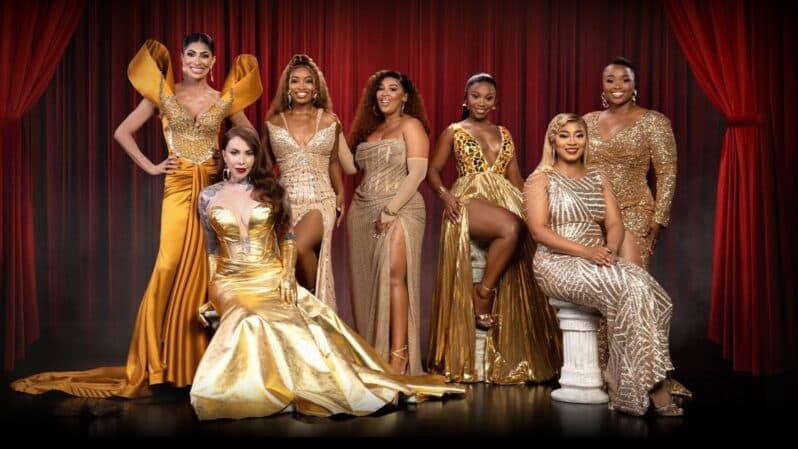
The Real Housewives of Durban Seasons 1-5
Our eThekwini queens are back with a brand-new season. Stream Season 5 now, with new episodes every Friday.
SA celebs open up about divorce on Untied
The action heats up on Empini
More Mzansi gold

20+ addictive South African reality shows to stream
Stream The Catch, The Real Housewives of Durban, The Mommy Club, and more of South Africa’s best reality shows on Showmax.

Mablerh returns to host The Real Housewives of Durban reunion
Mablerh returns to host The Real Housewives of Durban reunion for the third year in a row. The Season 5 reunion drops in two parts on Showmax, premiering 4 July and 11 July 2025.

Obstruction S1
A fiery netball superstar dreams of being noticed by the Gauteng provincial coach and playing for the national team… until her mom uproots her to a new school.

Khanyisa Jam Jam opens up in Laugh Africa Comedy Club special
Comedian Khanyisa Jam Jam talks about being part of the Laugh Africa Comedy Club special, now available to stream on Showmax.

